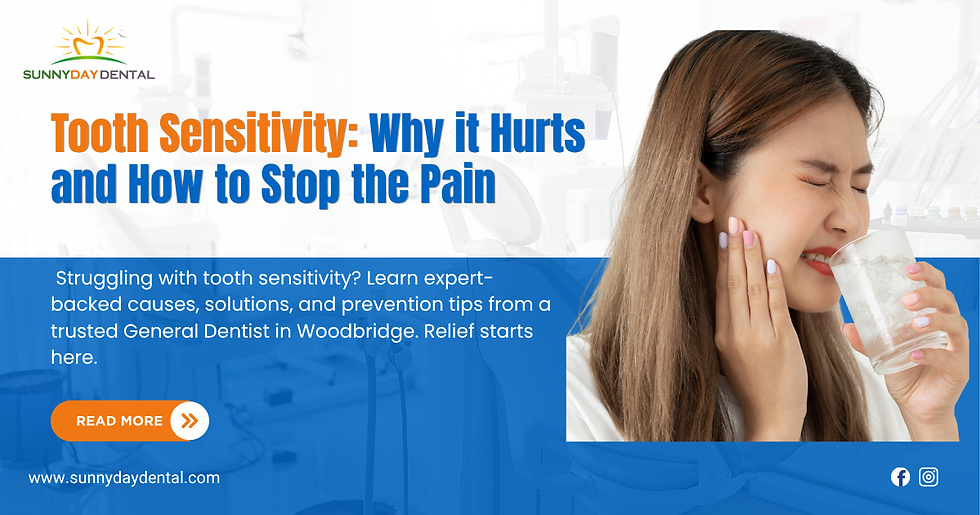5 Tips to Prevent Dental Emergencies
- Sunny Day Dental
- Jul 15
- 3 min read

Dental emergencies can be painful, sudden, and sometimes frightening. From chipped teeth during dinner to a swollen jaw on a weekend, these issues often strike without warning. But here's the truth: with the right habits and knowledge, you can prevent dental emergencies before they disrupt your life.
As a dental professional with years of experience, I’m sharing 7 expert-backed strategies to help you avoid unnecessary discomfort, time off work, and unplanned trips to the emergency dentist in Woodbridge.
1. Stick to a Strong Daily Dental Care Routine
Preventing dental emergencies starts at home. A solid daily dental care routine includes brushing twice a day with fluoride toothpaste, flossing daily, and using an antibacterial rinse to reduce harmful bacteria.
Skipping these steps can allow plaque and tartar to build up, leading to decay or gum disease common causes of dental emergencies. According to the Journal of Clinical Periodontology (2025, individuals who floss daily are 60% less likely to face sudden gum issues that require urgent care.
2. Know the Signs of Dental Damage Early
Many emergencies begin with small problems that go unnoticed. Sensitivity to hot or cold, tiny cracks, bleeding gums, or a dull ache may seem harmless at first but could be signs of dental damage.
Catching issues early means simpler treatment and fewer surprises. If your tooth feels “off,” don’t wait. A proactive visit now may help you avoid a painful emergency later.
3. Prioritize Routine Dental Checkups
A surprising number of dental emergencies happen because problems were left undiagnosed. Scheduling routine dental checkups every six months gives your dentist a chance to spot early issues like tooth decay, infection, or gum recession.
Professional cleanings also remove plaque from places your toothbrush can’t reach. It’s one of the simplest and most effective ways to prevent dental emergencies.
4. Avoid Bad Chewing Habits
Chewing on ice, biting your nails, or using your teeth as tools can cause serious damage. Cracked teeth, loosened fillings, and jaw strain often result from these habits.
If you tend to munch on pens or open bottles with your teeth, break the cycle now to prevent dental emergencies. Replace bad habits with sugar-free gum or healthy snacks to protect your enamel and jaw joints.
5. Protect Your Teeth During Sports and Sleep
If you or your child plays sports, a custom mouthguard is a must. It protects against impacts that could knock out or chip teeth. Similarly, nightguards help patients with bruxism avoid enamel wear or fractures.
The Canadian Dental Association recommends guards as a frontline solution for athletes and nighttime grinders. These small investments can make a big difference in preventing dental emergencies.
How do you prevent dental emergencies?
To prevent dental emergencies, follow a consistent daily dental care routine, avoid harmful chewing habits, monitor signs of dental damage, and visit your dentist regularly for routine dental checkups.
Keep Emergencies Away with Smart, Simple Habits
Dental emergencies are often preventable with a bit of daily effort, awareness, and consistency. By maintaining a proper daily dental care routine, recognizing signs of dental damage, and committing to routine dental checkups, you protect not just your teeth, but your confidence, time, and wallet too.
Visit Sunny Day Dental for Prevention That Works
At Sunny Day Dental in Woodbridge, we focus on prevention-first dentistry. Our team helps you stay ahead of issues with personalized care plans, thorough exams, and patient-first support. If you’ve noticed changes in your smile or want help improving your routine, we’re here for you.
FAQs
1. Can dehydration increase the risk of dental emergencies?
Yes, dehydration reduces saliva production, which is essential for neutralizing acids and washing away food particles. Without enough saliva, you're at a higher risk for decay and infection. Stay hydrated, especially in hot weather or if you take medications that dry the mouth.
2. Are dental emergencies more common in older adults?
Older adults may be more prone to emergencies due to weakened enamel, receding gums, or long-term dental work that has aged. Regular checkups and updated dental treatments can significantly lower their emergency risk.
3. What should I avoid doing if I crack a tooth?
Avoid chewing on that side, eating hard or hot foods, or applying pressure. Rinse your mouth with warm water and call your dentist immediately. Delaying treatment can lead to further damage or infection.
4. Do whitening treatments increase the risk of dental emergencies?
Whitening is generally safe when done professionally. However, overuse of whitening kits or harsh ingredients can cause tooth sensitivity or irritation, which could escalate if not monitored. Always consult your dentist first.
5. Why are children more likely to need emergency dental care?
Children tend to fall more, engage in rough play, and often skip proper brushing, which makes them vulnerable to dental injuries or decay. Regular pediatric checkups, protective gear during sports, and parent-led brushing routines help reduce emergency visits.




Comments